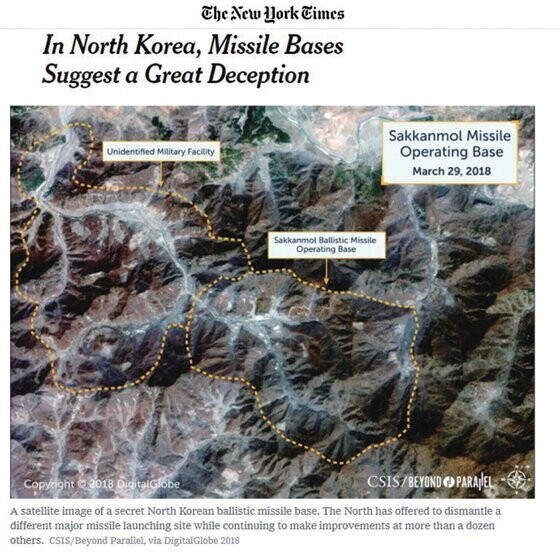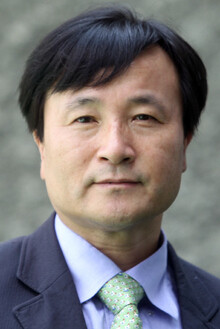hankyoreh
Links to other country sites 다른 나라 사이트 링크
[Column] An open letter to the NY Times

I’m the executive editor of South Korean newspaper called the Hankyoreh. Like many journalists around the world, I’m a devoted reader of the Times. During 2004 and 2005, I spent a year as a visiting researcher at an American university. What I was the most diligent about during my stay there was poring over the Times. I figured I’d get much more out of thoroughly reading that newspaper than struggling through university classes.
As it happened, 2004 was the year when George W. Bush and John Kerry were running for president. Since biased reporting by the media is a major controversy in every presidential election in South Korea, this gave me a good opportunity to see for myself how the Times covers a presidential election. I had been told time and time again that the Times openly endorses a candidate in an editorial, while maintaining neutrality and impartiality in its regular articles, unlike the South Korean press.
But as I read the newspaper’s reporting, I discovered that the Times’ reputation wasn’t grounded in fact. The pages of the newspaper were swamped with articles that openly supported Kerry. I also sincerely wanted Bush to lose the race, but the Times’ one-sided reporting made the allegations of bias in the South Korean press look like small potatoes. At the time, Kerry was under fire because of his previous support for the Bush administration’s invasion of Iraq, and I remember the Times plastering its opinion pages with columns by experts advising Kerry on how he could dig himself out of that hole. I was also perplexed by an endorsement editorial that spent more time arguing why Bush shouldn’t be reelected than why Kerry was fit for the office of president.
Reading the Times’ reporting about the Korean Peninsula these days, I once again find myself disappointed. To take one example, the Times recently cited a report by the Center for Strategic and International Studies in a story about how North Korea is developing its ballistic missile program at “hidden bases” and practicing a “great deception.” I won’t get into the distortions, exaggerations and inaccuracies of this article, such as the fact that the outside world had long been aware of what the article characterized as “hidden bases.” How could this be happening at the Times, where facts are supposed to be its very lifeblood and which is regarded as a role model by newspapers around the world?
When North Korea and the US agreed to hold a summit this past March, the Times took a very critical view toward these negotiations in an editorial titled “Donald Trump and North Korea: What a Fine Mess.” It’s not hard to guess why the Times runs such stories. They probably reflect the deep-seated distrust of and antipathy to President Donald Trump.
But I think there’s another factor at work. John Feffer, director of Foreign Policy in Focus at the Institute for Policy Studies, wrote that “the real obstacle to US-North Korean peace is [. . .] the foreign policy establishment in Washington,” which Feffer says “is deeply skeptical about the usefulness of negotiating with North Korea.” The Times too would seem to be subject to the shortcomings of being part of the establishment.
As a South Korean citizen, however, I can’t help noticing a paradox: President Trump’s outsider status, his profound hostility to the foreign policy establishment, and his gambler-like drive to win have in fact improved the chances of peace on the Korean Peninsula. I find Trump’s unfiltered language, his wild behavior and his arrogant egotism as disgusting as anyone else. But there’s one thing for which he deserves credit, and that’s his boldness in negotiating with North Korea.
The Times is widely regarded as a progressive-leaning newspaper. Progressives believe in peace; they believe in reconciliation and win-win arrangements, not confrontation and quarrels. Obviously, it will be very difficult to bring about North Korea’s denuclearization and impossible to predict the outcome. Just as obviously, it’s the job of the press to offer a clear-headed analysis of these efforts and raise concerns when they fall short.

But while reading the Times’ coverage, I sometimes feel that US national interest takes preference over peace on the Korean Peninsula and that the success of North Korea-US talks is treated as less important than concerns that their success might strengthen Trump’s position and buoy his spirits.
When Korea devolved into a battleground for the imperial powers in the late 19th and early 20th centuries, the Times focused on the dynamics between those powers without paying any heed to the plight or future of the Korean people. In 1909, it even printed an editorial that argued that Korea’s annexation by Japan was inevitable. I sincerely hope that the Times doesn’t repeat those mistakes.
By Kim Jong-gu, executive editor
Please direct comments or questions to [english@hani.co.kr]

Editorial・opinion
![[Column] Has Korea, too, crossed the Rubicon on China? [Column] Has Korea, too, crossed the Rubicon on China?](https://flexible.img.hani.co.kr/flexible/normal/500/300/imgdb/original/2024/0419/9317135153409185.jpg) [Column] Has Korea, too, crossed the Rubicon on China?
[Column] Has Korea, too, crossed the Rubicon on China?![[Correspondent’s column] In Japan’s alliance with US, echoes of its past alliances with UK [Correspondent’s column] In Japan’s alliance with US, echoes of its past alliances with UK](https://flexible.img.hani.co.kr/flexible/normal/500/300/imgdb/original/2024/0419/2317135166563519.jpg) [Correspondent’s column] In Japan’s alliance with US, echoes of its past alliances with UK
[Correspondent’s column] In Japan’s alliance with US, echoes of its past alliances with UK- [Editorial] Does Yoon think the Korean public is wrong?
- [Editorial] As it bolsters its alliance with US, Japan must be accountable for past
- [Guest essay] Amending the Constitution is Yoon’s key to leaving office in public’s good graces
- [Editorial] 10 years on, lessons of Sewol tragedy must never be forgotten
- [Column] A death blow to Korea’s prosecutor politics
- [Correspondent’s column] The US and the end of Japanese pacifism
- [Guest essay] How Korea turned its trainee doctors into monsters
- [Guest essay] As someone who helped forge Seoul-Moscow ties, their status today troubles me
Most viewed articles
- 1[Column] The clock is ticking for Korea’s first lady
- 2[Correspondent’s column] In Japan’s alliance with US, echoes of its past alliances with UK
- 3Samsung barricades office as unionized workers strike for better conditions
- 4After 2 months of delayed, denied medical care, Koreans worry worst may be yet to come
- 5[Column] Has Korea, too, crossed the Rubicon on China?
- 6[Editorial] When the choice is kids or career, Korea will never overcome birth rate woes
- 7Hong Se-hwa, voice for tolerance whose memoir of exile touched a chord, dies at 76
- 8US overtakes China as Korea’s top export market, prompting trade sanction jitters
- 9Constitutional Court rules to disband left-wing Unified Progressive Party
- 10Nearly 1 in 5 N. Korean defectors say they regret coming to S. Korea